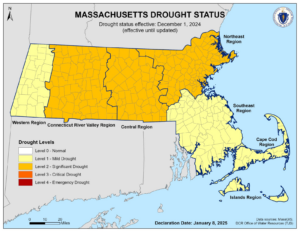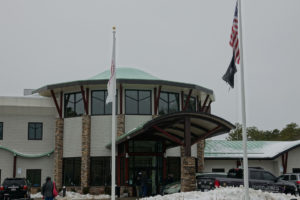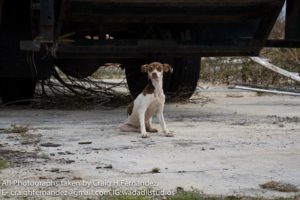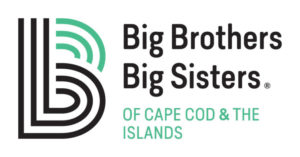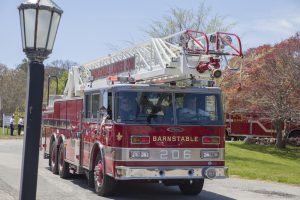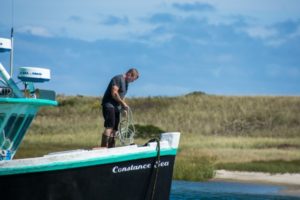 CHATHAM – The talk is serious.
CHATHAM – The talk is serious.
Three crew members are musing about the dire situation; there is pain, embarrassment.
During the depths of the discussion, Captain Greg Connors swings up to the fish pier in his boat the Constance Sea to pick up the three younger men.
He hears the disgust and uncharitable comments; Jacksonville’s upstart quarterback Blake Bortles had thrown for almost 400 yards, Tom Brady was lackluster, and the Patriots looked bad and slow.
“We’ve seen this before,” Connors says calmly, adding with a grin, “Belichick is with a white board right now fixing it.”
The crew sees he has a point and the conversation turns to other matters, such as getting over the infamous Chatham Bar.
A Wilmington native and Wellfleet summer kid, Connors has spent most of his life on the water and at 50 years (although he seems younger) he is a leader of the fleet. He chairs the board of the local fishing sector, engages in fisheries management, and is not shy advocating for policy changes. But he prefers to stay out of the wheelhouse of other fishermen. Connors approaches most things calmly, with a touch of humor.
He is happy with his career choice, proud to have put three kids through college, but he doesn’t consider fishing to be his life’s true calling. He can work seven days a week for months at a time – sometimes truly grinding hours – but he makes it clear where he would rather be:
In the middle of Lovers Lake, which he can see from his Chatham home, relaxing on an inflatable raft shaped like a slice of pizza.
“I like to float on the pond,” he says.
On this fall day the slice seems far away. He finishes checking in with government overseers five times via computer, a requirement before he even starts catching fish, long before filing a catch report. It’s annoying but he shrugs it off.
“The government loves redundancy,” he says.
Before managers got the computer system updated, Connors says, it took about three minutes per entry. Now he can do them all in about that amount of time, so that’s progress.
Dealing with baffling bureaucracy is something he is well-versed in, although he does wonder why all the checking in; “Do they think I left in the middle of the trip?” he asks with a grin.
The grin fades when he talks about camera monitors on boats, however. He thinks that’s a step too far, way too intrusive for fishermen who carved a life away from a structured 9-5 world. Plus, he adds, he sees no real need for cameras, which catalogue catch and by-catch:
“We went from 1,300 to less than 200 boats, and now they want to monitor?”
Connors has known two distinct personalities of the Chatham port. He started fishing for groundfish, such as cod, and then for the last 18 years or so switched to monkfish, dogfish and skate, depending on the season.
Connors was one of the first to target the skate fishery years ago, but now it’s a staple of the fleet — Cape and Islands fishermen landed more than 7 million pounds in 2016, making it the third highest landed seafood for the region. He can fish for them year-round, while gillnetting dogfish is more of a summer fishery.
It’s common enough for Connors and his crew to spend a day at sea, come to the fish pier and unload to his buyer, Marder Trawling, shower, and then go back out again at 1 a.m. On this day the trip takes place at a more “civilized” time, starting at 7:30, hauling in skates a few hours after setting dogfish gear.
The crew knows the routine and there is no shortage of joking around. A white hockey mask hangs in the wheelhouse, given to crewmate Jay Soares. Soares, who wields a knife with frightening speed, is often in the go-to position of arranging the skates in the enormous bin and cutting off the wings before they are iced. The skates come to him by way of Nick Kline, Nicky as they call him, and often enough a skate smacks Soares in the head as Kline passes fish quickly and laterally once he frees them from the net. Today Soares is not wearing the mask and from a garbled curse or two it sounds like he may have been hit not by a puck, but by an errant skate.
Connors, at the winch, brings in the first of 15 gillnets, each 300 feet long, strung out in sections.
The skates come in and Connors knocks them on the head with a mallet so they are easier to handle. Then they slide down the line to Nick who removes them from the net and sends them toward Soares.
Matt Lucas, tall and the most talkative of the group, is in the back flaking, untangling the gillnets for the next set. He has lost more than 25 pounds since he started, and couldn’t have been that big to begin with, but near him is a buoy ball named “Donut” in his honor.
“Kids aren’t always nice to each other,” Connors deadpans.
Lucas doesn’t seem to care much. He is from a fishing family. His father Ted Lucas is a well-known trap fisherman who now captains a research vessel for Provincetown’s Center for Coastal Studies. His grandfather is Paul Lucas, a.k.a. Captain Eelgrass, who years ago used to don a costume to help raise money for Monomoy Community Services.
Lucas’ “Donut” buoy ball is keeping company with the “Halle Berry” ball, named for the actress “because she is awesome,” says Connors.
Connors says Scott MacAllister, who used to crew for him and now has a boat of his own, called halibut “Halle Berrys” because they are a great fish to catch.
Connors started fishing when he was 19, after he tried college and felt it wasn’t for him. His first crew job on a longline boat he made virtually no money, but he fell in love with the life and saw potential.
“I find the hourly wage kind of soul-sucking,” Connors says. “I (enjoy) the thrill of being able to produce your income … If over the years you need more money you put a little more effort in, push the weather a little bit, run a little more gear and you really do see results from that.”
After longlining, he worked on Roger Horn’s boat who, after a bit, let him run the boat to catch dogfish right around the time that population exploded.
“It took some skill to be a groundfisherman,” Connors says. “Dogfish are everywhere. It’s pretty easy. It’s straight labor.”
Back then prices were stronger and Connors ended up buying his own boat, the Black Mariah, which ended up wrecking on the Chatham Bar before weather forecasting improved to where it is today. He replaced the Mariah with the Constance Sea, which he has captained for close to 20 years now.
Connors is hoping to see changes in management for the skate fishery he helped create. As of now the skate limit per trip is 4,100 pounds plus 5,000 more pounds for bait, and anyone can enter the fishery.
Many, including the Fishermen’s Alliance, are working to limit access to the skate fishery to allow people who are serious about it, with a history in the fishery, to make a decent living. The trick is to also protect younger fishermen who just got into the fishery and don’t have as much fishing history as longtime fishermen, such as Connors.
“Throughout the years, we’ve seen the total quota being caught in shorter and shorter amounts of time, causing the fishery to shut down and boats to be tied up,” says Amanda Cousart, policy analyst at the Fishermen’s Alliance. She adds the current structure creates short seasons, pressuring people to catch as much and as fast as they can.
Connors can attest to that.
“The way they have set it up now you have to be out there every day,” Connors says. “If the weather isn’t that great we go anyway, which is another good argument for some kind of limited access fishery.”
No problem with the weather today, the sea flat as glass as Lucas flakes the net and the rest of the crew continues to untangle the large amount of skates that have come aboard.
All the crew wear gloves because the spines on winter skates will shred your fingers. They shred gloves too, so underneath the blue rubber the crew wraps black electric tape, looking like boxers getting ready for the ring.
Connors has to wrap his wrist as well, he hurt it awhile back and there is no time to go to the doctor. So he hopes for the best and wields the mallet as AC/DC’s Highway to Hell blares in the background.
“Whack a mole,” he says. “I’m waiting for that to become a profession. I’ve been training my whole life.”
One of the lines gets jammed up under the boat and Lucas has a problem getting it free, which slows them down.
“If that is the worst thing that happens today, it’s going to be a great day,” says Connors.
Connors’ son Sean steams by, working on Captain Nick Muto’s lobster boat. Connors waves and then yells into the wind about the leftover Chinese food his son stole out of the refrigerator. True, Sean was up earlier, but hey, they were chicken wings.
Before he pulls up more gillnets clogged with skate, Connors and the crew set their gear for dogfish. The trick is to find a seam on the bottom, without an abundance of lobster pots.
“Plenty of open spaces, but no fish,” Connors says. “This is kind of where we have been the last few days.”
They don’t quite catch their 6000-pound limit for dogfish but if they set again they’ll go over, so they head for home.
The dock is crowded with boats unloading dogs and skates, and lobstermen cruising around waiting for a chance to get some fuel. Connors, who knows the rules well, calls one boat over so it can pull a hose over his deck and fuel up while others unload. Going home an hour or more earlier after a long day on the water can make a big difference.
He goes over the schedule for tomorrow with the crew. He offers a choice because the tides offer him one: They could leave at 9 a.m. and get their “asses kicked” a bit by rough water or leave before 3 a.m. for a smoother ride.
Everyone prefers the ass kicking.





